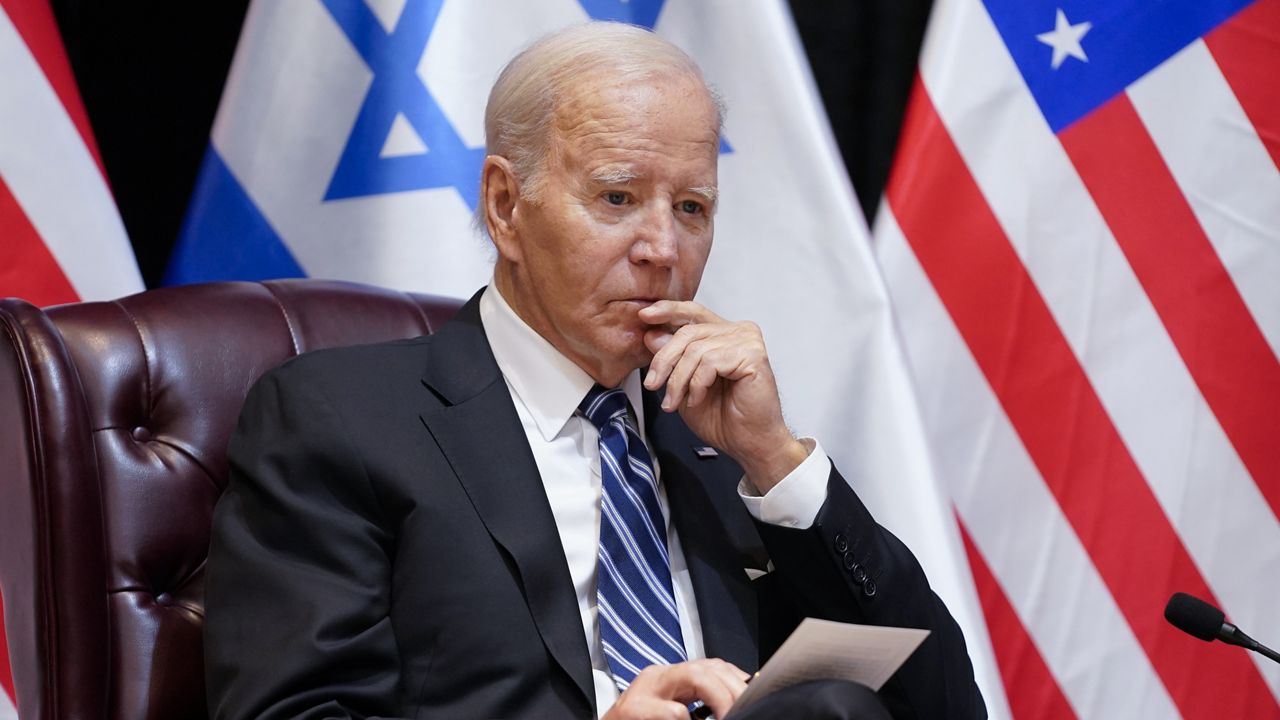A new poll shows an increase in attention on foreign policy among Americans in 2024 as President Joe Biden heads into the new year with mounting challenges overseas and his request for billions in foreign aid in limbo on Capitol Hill.
The poll, conducted by the Associated Press-NORC Center for Public Affairs Research on Nov. 30-Dec. 4, found about twice as many participants cited foreign policy topics as a top issue for government to work on in the year ahead as compared to the poll in Dec. 2022.
The rise in focus overseas was true of both major parties, with about 46% of Republicans and 34% of Democrats naming a foreign policy topic as a top-five issue for government to hone in on.
Biden has sought to make America’s leadership on the global stage a major priority of his administration, proclaiming a return to what he considers traditional norms of diplomacy when he took office. A former chair of the Senate Foreign Relations Committee, Biden often touts his knowledge and experience navigating U.S. relationships around the world.
“I think I know as much about American foreign policy as anybody living, including [Former Secretary of State Henry] Kissinger,” Biden told donors at a reception in June.
And heading into 2024, with wars raging in Europe and the Middle East, Biden made clear the topic is still top of mind.
“I hope that they understand that we’re in a better position than any country in the world to lead the world,” Biden said in an interview with Ryan Seacrest over the weekend to mark the new year.
But this year, the president is facing a number of challenges amid the crises overseas and the future of his national security supplemental funding request -- which includes billions for Ukraine amid Russia’s invasion, Israel as it battles Hamas, the Indo-Pacific as China exerts its influence in the region and the U.S.-Mexico border -- remains uncertain.
Additional aid to Kyiv has become a sticking point for some Republicans who insist any more funding must be tied to significant changes to U.S. border policy. A bipartisan group of senators have been engaged in negotiations over such changes for weeks but a breakthrough deal still remains elusive.
The ask for more assistance to Ukraine is particularly urgent for Biden, who pledged in December that the U.S. will support Ukraine for “as long as we can” – marking a crucial shift from his long-time commitment of U.S. support for “as long as it takes” amid the uncertainty on Capitol Hill.
Last week, the U.S. delivered what the White House warned would likely be the last aid package to Kyiv without new funding approved by Congress just days before Russia intensified attacks on Ukraine as the new year began.
In the Middle East, the Democratic president is facing growing skepticism at home and abroad over his continued backing of Israel as the civilian death toll in Gaza rises.
Biden recently has urged Israel to “be more careful” with its operations in the Palestinian territory but has not called for a full cease-fire, sparking protests by some at home and putting the U.S. at odds with allies overseas.
Some Democratic lawmakers want Biden’s request for additional aid to Israel to include conditions that Israeli Prime Minister Benjamin Netanyahu and his government take concrete steps to reduce Palestinian deaths in its operations against Hamas.
But the White House has not embraced such a suggestion and twice in December, including once last week, the Biden administration bypassed Congress to greenlight emergency weapons sales to its Middle East ally.
Biden also sought to stabilize recently rocky relations with Beijing during a summit with Chinese leader Xi Jinping in California in November.
Tensions between the two world powers have boiled over a Chinese spy balloon shot down over the U.S. and Taiwan, the self-ruled democratic island that China considers part of its territory.
In a year-end address over the weekend, Xi pledged the reunification of China and Taiwan was inevitable.



